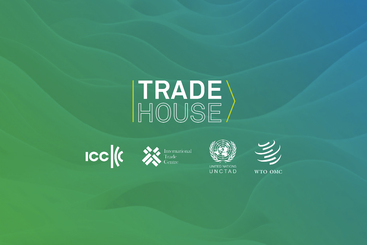The urgent need for international cooperation on policies at the intersection of climate and trade is a prominent feature of contemporary debates among governments, private stakeholders, think tanks, and academia.
Trade and policy fragmentation resulting from uncoordinated national carbon markets, unilateral environmental standards enforced at the border, and green industrial subsidy races, risk reducing the climate and economic benefits from trade, while making effective climate policies unnecessarily costly and reinforcing international economic inequities.
The World Trade Organization (WTO) and other international organisations have pulled out all stops in their efforts to raise awareness of the imperative for international climate and trade policy coordination. Events such as the WTO Public Forum and the first-ever “Trade Day” at COP-28 last December highlight the crucial role international trade plays in supporting climate change adaption and mitigation through green supply chains and technological innovation.
However, those who may have expected that increasing public prominence of the climate and trade policy nexus would result in expedient progress or even tangible results at this week’s WTO Ministerial Conference, MC-13, (26-29 February 2024) will be disappointed. Opposition from a handful of WTO members to ‘new’ agenda items, the sputtering of WTO’s negotiation engine, and unfavourable geopolitical conditions require managed expectations and a redefinition of what constitutes ‘success’ when it comes to WTO-centered processes in general and, in particular, the WTO’s - so far - informal sustainability agenda.
The merit of WTO negotiation outcomes on sustainable trade should be assessed not against ideal world scenarios and dated hopes for binding multilateral agreements ready for national implementation, but against more realistic benchmarks. Convergence on non-binding instruments, as well as defining principles and codes of conduct to guide best national policy practices, would make for valuable achievements in the medium term.
Premature optimism for climate change progress at MC-13
Recent momentum in international climate negotiations under the auspices of the United Nations Framework Convention on Climate Change (UNFCCC) may have fueled some short-lived optimism for similar progress on sustainable trade issues at MC-13. After all, the last Ministerial Conference (MC-12) acknowledged the urgency of addressing global environmental challenges like climate change and reaffirmed the need to support developing countries, especially Least Developed Countries (LDCs), in achieving sustainable development.
Preparatory work on behalf of some WTO members aimed to at least put the most pressing trade policy-related sustainability issues on the agenda of the WTO’s multilateral committees. These efforts include proposals focused on addressing trade and global environmental challenges more broadly, new-era industrial policies, the link between environmental measures and development, and integrating developing countries into sustainable supply chains. For example, a February 2023 European Union communication to WTO Members exemplifies this effort by outlining a pragmatic approach to ‘Reinforc[e] the Deliberative Function of the WTO to Respond to Global Trade Policy Challenges’. China also supports multilateral discussions on carbon and reinvigorating the WTO’s Trade and Environment Committee.
The procedural modesty and pronounced incrementalism that characterise these proposals may well be inspired by a recognition of the complexities of contemporary geopolitics that have generated a highly challenging environment for contemporary trade multilateralism. It may also reflect lessons learned from two decades of long-lasting fishery subsidy negotiations. However, it remains to be seen whether even the lowered benchmark of success can be met.
Reality check
MC-13 might be a disappointment for those focused on climate change action. In the best-case scenario, the Ministerial Declaration could entail a mere paragraph reaffirming existing “sustainable development” commitments as per the 1994 Marrakesh Agreement.
India has repeatedly stated that environment and climate do not belong on the WTO’s agenda and signalled opposition to any related multilateral work programme, including direct opposition to the proposals put forward by the European Union. This is jeopardising broader progress desired by a growing number of WTO members who wish to address sustainable trade policy challenges in the most inclusive setting – i.e. multilateral (as opposed to plurilateral or WTO external cooperation). India’s opposition, however, is not entirely surprising given India’s longstanding concerns about both an expanded multilateral agenda as well as integrating binding commitments into the WTO legal framework that result from plurilateral negotiations.
An optimistic reading of the Indian opposition might suggest it’s a bargaining strategy at work that leverages its veto power on sustainability issues to gain ground with regards to its agricultural trade policy priorities in WTO negotiations – a strategy that has, we recall, frequently resulted in the collapse of negotiations at past WTO Ministerial Conferences.
However, this stance may further force an even more pronounced shift of efforts towards advancing the climate and trade nexus policy deliberations in plurilateral WTO initiatives that typically include a much smaller subset of WTO members. Worse, it may further catalyse WTO-extra climate and trade cooperation arrangements and render the unilateral climate and trade policy route ever more appealing. Such an outcome would effectively set incentives for further trade and policy fragmentation, reducing the climate and economic benefits derived from international trade.
Some progress on the plurilateral front
At MC-13, the WTO’s plurilateral Trade and Environmental Sustainability Structured Discussions (TESSD), are presenting an updated roadmap. Even with this, the 2024 work plan from the 76 TESSD members illustrates modest ambitions, promising only to “guide work towards identifying possible concrete actions or recommendations by the next Ministerial Conference”.
Nonetheless, the TESSD members are likely to present potential “options” for the urgent phasing out of fossil fuel subsidies. Of note is also the New Zealand-led Fossil Fuel Subsidy Reform (FFSR) initiative co-sponsored by a 48-country strong subgroup of TESSD members. Another plurilateral dialogue on plastics pollution comprising 76 co-sponsors succeeded in agreeing on a joint MC-13 ministerial statement.
However, currently, only a handful of LDCs and Small Island Developing States (SIDS) are members of the TESSD, which may reflect capacity constraints or concerns that the agenda does not fully prioritise theirinterests (e.g. adaptation, technology transfer). But it may also indicate the preference to continue discussions in multilateral WTO committees (e.g. the Committee for Trade and Environment, the Committee on Technical Barriers to Trade, or the Committee on Subsidies and Countervailing Measures).
Ministerial engagement
It is also notable that MC-13 features, for the first time, ministerial roundtables on industrial policy and sustainable trade. But these are, at this point, unlikely to deliver more than symbolism and pre-prepared statements on good intentions. However, a larger group of developing countries is rumoured to be drafting a declaration on several sustainable trade issues, giving voice to their desire to include their concerns in daily multilateral deliberations.
The Coalition of Trade Ministers on Climate – a WTO external initiative launched in 2023 to promote policy coordination at the intersection of trade, climate, and development through ministerial engagement – will meet for the second time to give impetus to their attempt to bridge the gap between trade and climate change negotiators. While this effort is well intentioned, it must avoid the impression that it aims to create an alternative forum on climate and trade nexus cooperation that stands in competition with the WTO.
Managing expectations, redefining success
While these developments illustrate the much-needed increasing intensity of WTO members’ engagement on sustainable trade issues at various levels, they also showcase the massive distance of travel to ideal-world outcome scenarios. It is therefore crucial to manage expectations for immediate, binding agreements on the climate, trade, and development nexus within the WTO in the context of the given set of geopolitical contingencies, which increasingly display the prevalence of national interest conflicts over self-interested multilateral cooperation.
The discursive value of the WTO as a diplomatic forum can, under favourable conditions, still result in enhanced coordination of national policy approaches. Beyond mere system preservation, success may lie in WTO members’ convergence on non-binding instruments, principles on best practices, and codes of conduct guiding national climate and trade policy formulation (e.g. the design of internationally interoperable carbon markets and carbon border measures, and least-trade restrictive green industrial policy measures, amongst others).
It remains imperative, against this background, to uphold rather than prematurely abandon stakeholder support for existing efforts that promote the reinvigoration of the Organization’s deliberative functions. Thematically, the WTO’s – currently still informal – multilateral sustainability agenda should stand at the front and centre of such endeavours.





